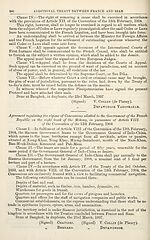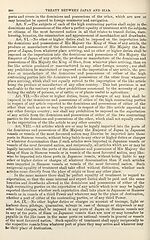1926
(339) [Page 287] - Japan: Treaty between Japan and Siam
Download files
Complete book:
Individual page:
Thumbnail gallery: Grid view | List view
![(339) [Page 287] - Japan: Treaty between Japan and Siam](https://deriv.nls.uk/dcn17/1964/9258/196492582.17.jpg)
TREATY OE FRIENDSHIP, COMMERCE AND
NAVIGATION BETWEEN JAPAN AND SIAM
Signed at Bangkok, 25th Febkttaky, 1898
His Majesty the Emperor of Japan and His Majesty the King of Siam, being
•equally animated by a desire to promote the relations of friendship, commerce and
navigation which happily exist between their respective States and subjects, have
resolved to conclude a Treaty for that purpose, and have named as their Plenipo¬
tentiaries that is to say:
His Majesty the Emperor of Japan, Manjiro Inagaki, Shogui, His Majesty’s
Minister Resident at the Court of His Majesty the King of Siam, and His Majesty
•the King of Siam, His Royal Highness Prince Krom Luang Devawongse Varoprakar,
Knight of the Order of Chakrakri, First Class of the Order of Rising Sun, etc.,
Minister for Foreign Affairs of His Majesty the King of Siam, who, after having
communicated to each other their respective full powers, found to be in good and
•due form, have agreed upon and concluded the following Articles:—
Art. I.—There shall be constant peace and perpetual friendship between Japan
and Siam, and the subjects of each of the high contracting parties shall enjoy in
'the dominions and possessions of the other full and entire protection for their
persons and property according to the established law of the country.
Art. II.—It shall be free to each of tlie contracting parties to appoint Consuls-
■General, Consuls, Vice-Consuls and Consular Agents to reside in the to wns and ports
of the dominions and possessions of the other, where similar officers of other Powers
are permitted to reside. Such Consuls-General, Consuls, Vice-Consuls and Consular
Agents, however, shall not enter upon their functions until after they shall have been
approved and admitted in the usual form by the Government to which they are sent.
They shall enjoy all the honours, privileges, exemptions and immunities which are
or may be granted to Consuls of the most favoured nation.
Art. III.—The subjects of each of the high contracting parties may enter,
remain and reside in any part of the dominions and possessions of the other, where
the subjects and citizens of the nation most favoured in these respects are permitted
to enter, remain and reside; they may there hire and occupy houses, manufactories
shops and warehouses, and they may there engage in trade by wholesale and retail
in all kinds of produce, manufactures and merchandise, paying no other or higher
taxes, imposts, charges or exactions of any kind than are now or may hereafter be
paid by the subjects or citizens of the most favoured nation.
In all that relates to travel, trade and residence ; to the acquisition, possession
and disposal of property of all kinds, and to the right to engage in all kinds of busi¬
ness, occupation and enterprise, the subjects of each of the contracting parties in the
dominions and possessions of the other shall at all times enjoy the treatment
accorded to the subjects or citizens of the most favoured nations.
Art. IV.—There shall be reciprocally full and entire freedom of commerce and
navigation between the dominions and possessions of the two high contracting
parties. The subjects of each of the contracting parties shall have liberty freely
and securely to come and go with their ships and cargoes to and from all places,
NAVIGATION BETWEEN JAPAN AND SIAM
Signed at Bangkok, 25th Febkttaky, 1898
His Majesty the Emperor of Japan and His Majesty the King of Siam, being
•equally animated by a desire to promote the relations of friendship, commerce and
navigation which happily exist between their respective States and subjects, have
resolved to conclude a Treaty for that purpose, and have named as their Plenipo¬
tentiaries that is to say:
His Majesty the Emperor of Japan, Manjiro Inagaki, Shogui, His Majesty’s
Minister Resident at the Court of His Majesty the King of Siam, and His Majesty
•the King of Siam, His Royal Highness Prince Krom Luang Devawongse Varoprakar,
Knight of the Order of Chakrakri, First Class of the Order of Rising Sun, etc.,
Minister for Foreign Affairs of His Majesty the King of Siam, who, after having
communicated to each other their respective full powers, found to be in good and
•due form, have agreed upon and concluded the following Articles:—
Art. I.—There shall be constant peace and perpetual friendship between Japan
and Siam, and the subjects of each of the high contracting parties shall enjoy in
'the dominions and possessions of the other full and entire protection for their
persons and property according to the established law of the country.
Art. II.—It shall be free to each of tlie contracting parties to appoint Consuls-
■General, Consuls, Vice-Consuls and Consular Agents to reside in the to wns and ports
of the dominions and possessions of the other, where similar officers of other Powers
are permitted to reside. Such Consuls-General, Consuls, Vice-Consuls and Consular
Agents, however, shall not enter upon their functions until after they shall have been
approved and admitted in the usual form by the Government to which they are sent.
They shall enjoy all the honours, privileges, exemptions and immunities which are
or may be granted to Consuls of the most favoured nation.
Art. III.—The subjects of each of the high contracting parties may enter,
remain and reside in any part of the dominions and possessions of the other, where
the subjects and citizens of the nation most favoured in these respects are permitted
to enter, remain and reside; they may there hire and occupy houses, manufactories
shops and warehouses, and they may there engage in trade by wholesale and retail
in all kinds of produce, manufactures and merchandise, paying no other or higher
taxes, imposts, charges or exactions of any kind than are now or may hereafter be
paid by the subjects or citizens of the most favoured nation.
In all that relates to travel, trade and residence ; to the acquisition, possession
and disposal of property of all kinds, and to the right to engage in all kinds of busi¬
ness, occupation and enterprise, the subjects of each of the contracting parties in the
dominions and possessions of the other shall at all times enjoy the treatment
accorded to the subjects or citizens of the most favoured nations.
Art. IV.—There shall be reciprocally full and entire freedom of commerce and
navigation between the dominions and possessions of the two high contracting
parties. The subjects of each of the contracting parties shall have liberty freely
and securely to come and go with their ships and cargoes to and from all places,
Set display mode to:
![]() Universal Viewer |
Universal Viewer | ![]() Mirador |
Large image | Transcription
Mirador |
Large image | Transcription
Images and transcriptions on this page, including medium image downloads, may be used under the Creative Commons Attribution 4.0 International Licence unless otherwise stated. ![]()
| Asian directories and chronicles > 1926 > (339) [Page 287] - Japan: Treaty between Japan and Siam |
|---|
| Permanent URL | https://digital.nls.uk/196492580 |
|---|
| Attribution and copyright: |
|
|---|---|
| Description | Volumes from the Asian 'Directory and Chronicle' series covering 1917-1941, but missing 1919 and 1923. Compiled annually from a multiplicity of local sources and research. They provide listings of each country's active corporations, foreign residents and government agencies of all nationalities for that year, together with their addresses. Content includes: various treaties; coverage of conflicts; currencies and taxes; consular fees; weights and measures; public holidays; festivals and traditions. A source of information for both Western states and communities of foreigners living in Asia. Published by Hongkong Daily Press. |
|---|---|
| Shelfmark | H3.86.1303 |
| Additional NLS resources: |

